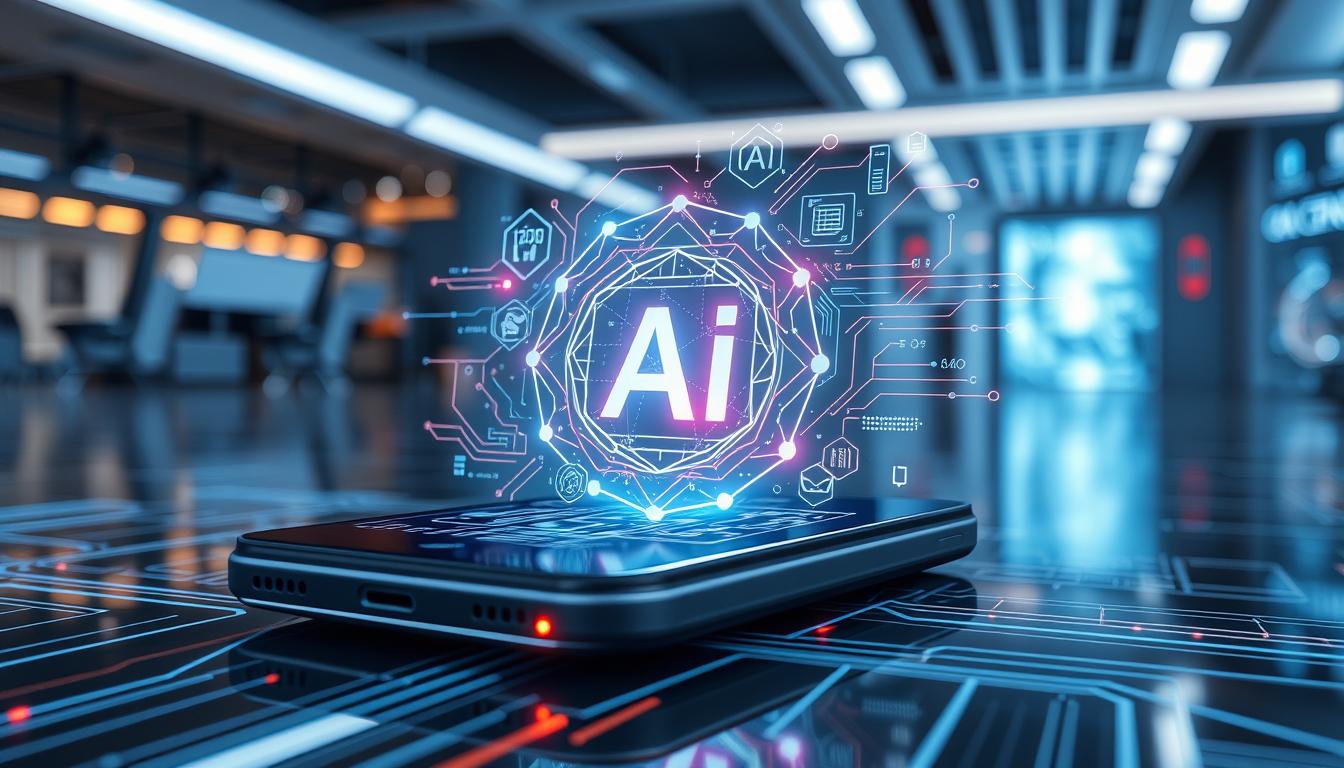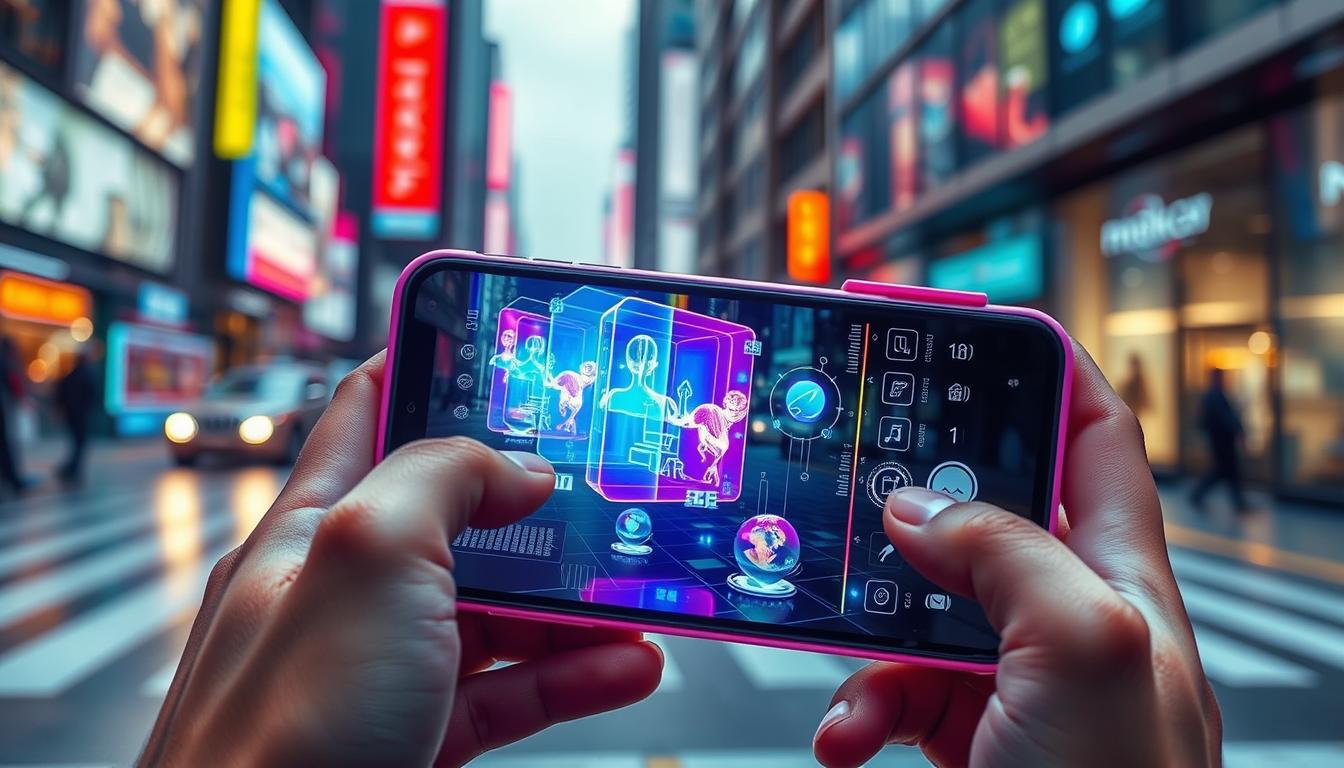
New technologies that will change everything are always coming in the world of future mobile app development technologies. There are currently approximately 90% of people in the world who have a smartphone, which means there are more people who can use new apps every day.
We will explore the recent developments that will change the way mobile apps are developed in India, both for the better and to make them more valuable to everyone.
React Native is changing the game in mobile app development. It’s made by Facebook and is now a top choice for developers. It lets them build apps that work great on both iOS and Android with less work and cost.
React Native uses JavaScript and React to make building apps easier. Developers can write code once and use it on many platforms. This saves time and money. Plus, it runs fast because it turns into native components directly.
React Native has a lot of libraries and integrations that make development faster. Developers can use many ready components and tools. This helps them make apps that are more feature-rich and engaging.
From UI elements to data management, the libraries offer everything needed for great cross-platform app development solutions.
| Features | React Native | Traditional Native Development |
|---|---|---|
| Code Reusability | High | Low |
| Development Speed | Faster | Slower |
| Performance | Excellent | Excellent |
| Platform Consistency | High | Low |
The react native ecosystem is growing fast. It’s set to be a big part of the future of mobile app development. It offers a smooth and efficient way to make apps for different platforms.
Flutter, Google’s open-source framework, is changing the game in mobile app development. It lets developers make apps that work great on both Android and iOS. This is a big deal in the industry.
What makes Flutter special is how it lets developers work across different platforms with one codebase. This cuts down on development time and costs. Before, making apps for each platform meant more work and longer projects.
Flutter also has a huge widget library. This means developers can quickly add pre-made widgets to their apps. This makes building apps faster and ensures a consistent look across platforms.
Also, Flutter apps run smoothly. They use the Dart programming language and Skia graphics engine. This means apps run fast and feel as good as native apps.
Google’s Flutter is getting more popular, changing how apps are made for different platforms. It has lots of features, a big community, and runs well. Flutter is set to lead in mobile app development soon.
“Flutter has revolutionized the way we approach mobile app development, empowering us to create high-performing, visually stunning applications that seamlessly span multiple platforms.”
The mobile app world is always changing. Two new technologies are going to change how we use apps: Progressive Web Apps (PWAs) and Artificial Intelligence (AI) and Machine Learning (ML).
Progressive Web Apps (PWAs) mix the ease of web apps with the smooth experience of apps. They use modern browsers to give fast, reliable, and fun experiences. Often, they work better than regular apps.
PWAs fit on all screens and devices, giving users a consistent and quick interface. They combine web reach with app-like features. This means users get a great experience without needing to download or update apps.
Artificial Intelligence (AI) and Machine Learning (ML) are changing how apps work. They make apps more personal and smart. AI and ML add cool features like personalized tips and smart automation.
With AI and ML, apps can act like smart assistants. They can suggest things you might like and automate boring tasks. These apps learn and change based on what you do and like.
| Feature | AI/ML Application | Benefits |
|---|---|---|
| Personalized Recommendations | Predictive analytics and user behavior analysis | Improved user engagement and conversion rates |
| Intelligent Automation | Natural language processing and task-specific algorithms | Streamlined workflows and enhanced productivity |
| Conversational Interfaces | Natural language processing and dialogue management | Seamless and intuitive user interactions |
The future of mobile apps will be shaped by PWAs and AI/ML. These technologies will make apps more engaging, personal, and smart. By using these new tools, app developers can meet the needs of today’s users.

The world of mobile apps is changing fast because of Augmented Reality (AR) and Virtual Reality (VR). These technologies are making mobile apps more engaging and innovative. They let users interact in new ways that go beyond what we’re used to.
AR and VR are used in many mobile apps, from games to shopping and learning. They mix the digital and real worlds. This creates new ways for businesses to connect with their customers.
In gaming and entertainment, AR and VR take users to new worlds. They make experiences more immersive. For shopping, these technologies let customers try on virtual clothes and see products in 3D. This makes shopping more fun and engaging.
Education is also benefiting from AR and VR. These apps make learning fun and interactive. They help users understand complex topics better by making them more visual and real.
As AR and VR get better, developers are finding new ways to use them in apps. This leads to more engaging and satisfying experiences for users.

“The future of mobile app development lies in the seamless integration of immersive technologies like AR and VR, revolutionizing the way users interact with digital content and services.”
The Internet of Things (IoT) and 5G technology are changing the game for mobile app development. Together, they’re making new and exciting mobile app experiences possible. These technologies are working together to open up new ways for apps to connect and interact with us.
The IoT connects devices, sensors, and smart systems, creating a vast network. This network gives mobile apps access to a lot of data. With IoT, we can automate our homes and monitor health remotely. It’s changing how we interact with the world and the services we use.
5G is the next big thing in wireless tech, offering super-fast speeds, super-low delays, and more data capacity. This means mobile apps can work with IoT data in real-time. Users get to enjoy smooth and quick app experiences.
The mix of IoT and 5G is ushering in a new phase of mobile app creation. Apps can now use lots of sensor data to offer personalized services. They can also create immersive experiences that were impossible before.
| IoT and 5G Synergies | Benefits for Mobile App Development |
|---|---|
| Interconnected devices and sensors | Expanded data sources and real-time analytics |
| Blazing-fast, low-latency connectivity | Responsive and seamless user experiences |
| Increased bandwidth and scalability | Support for data-intensive and immersive apps |
As IoT and 5G keep getting better, app developers need to keep up with these changes. They should use these technologies to their fullest. By doing so, the future of mobile apps looks very exciting.
The future of mobile app development is bright, filled with new technologies and frameworks. Solutions like React Native and Flutter are growing, along with AI, ML, AR, VR, IoT, and 5G. This means the mobile app world is changing fast.
Indian mobile app developers are ready to take advantage of these new trends. By keeping up with the latest and improving their skills, they can lead in mobile app development. They will create amazing user experiences and push mobile innovation forward.
The mobile app industry in India is set for an exciting future. With these new technologies, it’s expected to grow and change a lot. It will bring us innovative, engaging, and smart mobile experiences. This will change how we use the digital world.
React Native is a framework made by Facebook for making apps for both iOS and Android. It lets developers write one code that works on both platforms. This means faster app making, less code to write, and better app performance.
Flutter is a mobile app framework by Google that’s getting popular fast. It lets developers make apps for many platforms with one codebase. Flutter is loved for its wide widget library and fast app performance. Its unique UI approach makes it a top choice for many developers.
PWAs are special web apps that work great on mobile devices. They offer a smooth and engaging experience, combining web and app features. Users get fast, reliable, and immersive experiences through any browser.
AI and ML are changing mobile apps big time. They make apps smarter, more intuitive, and better suited to what users want. These technologies help apps understand and interact with users in smarter ways.
AR and VR are key in the future of mobile apps. They let apps offer engaging and interactive experiences. From games to shopping, these technologies are changing how we use apps, mixing the digital and real worlds.
IoT and 5G are set to change mobile app development a lot. They enable new app uses, like smart homes and remote health checks. With IoT and 5G, developers can make apps that connect more deeply and offer new solutions.